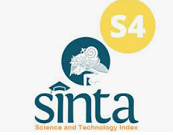Development of E-Module Based on Learning Cycle 6E for the Sub-material of the Distribution of Flora and Fauna in Indonesia and Worldwide for High School Students
Abstract
Full Text:
PDFReferences
Agusti, M., Ginting, S. M., & Solikhin, F. (2021). Pengembangan E-Modul Kimia Menggunakan Exe-Learning Berbasis Learning Cycle 5e Pada Materi Larutan Penyangga. Alotrop, 5(2), 198-205.
Astuti, N., Kaspul, K., & Riefani, M. K. (2022). Validitas Modul Elektronik “Pembelahan Sel” Berbasis Keterampilan Berpikir Kritis. Jurnal Eksakta Pendidikan (Jep), 6(1), 94-102.
Istuningsih, W., Baedhowi, B., & Sangka, K. B. (2018). The Effectiveness Of Scientific Approach Using E-Module Based On Learning Cycle 7e To Improve Students’ Learning Outcome. International Journal Of Educational Research Review, 3(3), 75-85.
Mimin, E. (2021). Pengembangan Model Kurikulum Paud 2013 Berbasis Kearifan Lokal Suku Ngalum Ok. Jurnal Obsesi: Jurnal Pendidikan Anak Usia Dini, 6(1), 374-388.
Nurdin, E. A., Kurnianto, F. A., Pangastuti, E. I., Nuriyanto, M. Z., & Bella, S. (2022). The Development of Android-Based Pocket Learning Media on Earthquake Disaster Mitigation Materials To Improve Spatial Thinking of Sma Students in The Era of The Industrial Revolution 4.0. In Social, Humanities, and Educational Studies (SHES): Conference Series (Vol. 5, No. 4, pp. 92-100).
Prihatiningtyas, S., & Sholihah, F. N. (2020). Physics Learning by E-module. LPPM Universitas KH. A. Wahab Hasbullah
Qamariah, N., & Windiyani, T. (2023). Pengembangan E-Modul Berbasis Flip Pdf Professional Pada Materi Pecahan. Didaktik: Jurnal Ilmiah Pgsd Stkip Subang, 9(2), 1274-1283.
Ridha, D., S. (2021). Pedoman Pengembangan Buku Teks Pelajaran Bidang Studi Geografi. Yogyakarta: Penerbit Ombak.
Rohman, N., Istiningsih, I., & Hasibuan, A. T. (2022). Analisis Kesiapan Mengajar Mahasiswa Prodi Pgmi Melalui Program Pengayaan Keterampilan Mengajar. Edumaspul: Jurnal Pendidikan, 6(1), 790-798.
Rudiatna, R. D. (2022). Strategi Peningkatan Kompetensi Siswa Melalui Penerapan New Teaching Factory Pada Kompetensi Keahlian Kriya Kayu Smk Negeri 14 Bandung. Joel: Journal Of Educational And Language Research, 2(4), 617-632.
Sari, A. P. P., Amin, M., & Lukiati, B. (2017). Buku Ajar Bioteknologi Berbasis Bioinformatika Dengan Model ADDIE. Jurnal Pendidikan: Teori, Penelitian, Dan Pengembangan, 2(6), 768-772.
Tanfiziyah, R., Khasanah, M., Riandi, R., & Supriatno, B. (2021). Inovasi Pembelajaran Berbasis Teknologi Informasi: Model Learning Cycle 5E Menggunakan Gather Town pada Materi Protista. Biodik, 7(3), 1–10.
Tarigan, Y., Amir, H., & Ginting, S. M. (2022). Pengembangan E-Modul Berbasis Learning Cycle 7e Pada Materi Larutan Penyangga. Alotrop, 6(1), 62-69.
DOI: http://dx.doi.org/10.20527/jpg.v11i2.18696
Article Metrics
Abstract view : 122 timesPDF - 43 times
Refbacks
- There are currently no refbacks.
Copyright (c) 2024 JPG (Jurnal Pendidikan Geografi)

This work is licensed under a Creative Commons Attribution 4.0 International License.
Indexed by:
JPG (Jurnal Pendidkan Geografi) is licensed under a Creative Commons Attribution 4.0 International License.

 JPG (Jurnal Pendidikan Geografi)
JPG (Jurnal Pendidikan Geografi)




















